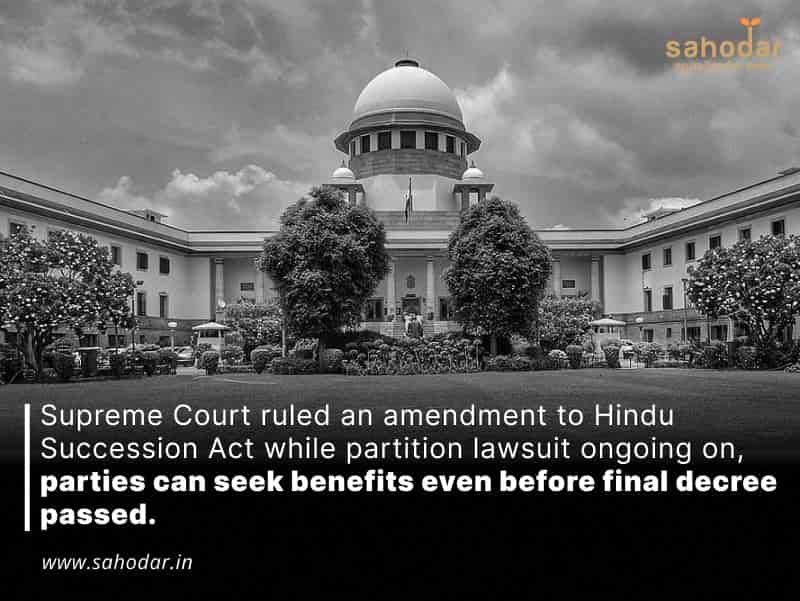The Supreme Court has ruled that if a partition lawsuit is still ongoing and a final decree has not been passed, the parties involved can take advantage of any amendments made to the law. This means that if the law has been amended, the preliminary decree in the partition suit can be modified during the final decree proceedings. The court also stated that in a joint property partition lawsuit, a decree by consent among only some of the parties cannot be considered valid unless it includes the written consent and signatures of all parties involved. This was established in the case of Prasanta Kumar Sahoo & Ors. v Charulata Sahu & Ors, by a bench comprising of Justice A.S. Bopanna and Justice J.B. Pardiwala.
Facts of the case:
In 1969, Mr. Kumar Sahoo passed away, leaving behind his three children – Ms. Charulata (daughter), Ms. Santilata (daughter), and Mr. Prafulla (son). On December 3, 1980, Ms. Charulata filed a partition lawsuit before the trial court, seeking a one-third share in both the ancestral and self-acquired properties of her late father.
The trial court issued a preliminary decree on December 30, 1986, granting Ms. Charulata and Ms. Santilata a one-sixth share in the ancestral properties and a one-third share in the self-acquired properties of Late Mr. Sahoo. The court also ordered that the daughters were entitled to mesne profits. However, the court awarded Mr. Prafulla a four-sixth share in the ancestral properties and a one-third share in the self-acquired properties of Mr. Sahoo, including the mesne profits.
Mr. Prafulla appealed to the High Court, claiming that all of Mr. Sahoo’s properties were ancestral. However, during the appeal proceedings, Ms. Santilata and Mr. Prafulla reached a settlement agreement on March 28, 1991, in which Ms. Santilata gave up her share of the property in exchange for Rs. 50,000.
Mr. Prafulla continued to litigate the issue of whether certain properties in question were ancestral or self-acquired by his father before the High Court. Meanwhile, Ms. Charulata filed a parallel appeal challenging the validity of the Settlement Deed dated March 28, 1991, which was entered into between her sister and brother.
On May 5, 2011, the High Court’s Division Bench rejected Mr. Prafulla’s appeal and declared the Settlement Deed between him and Ms. Santilata invalid. In response, Mr. Prafulla appealed to the Supreme Court, arguing that the 2005 amendments to the Hindu Succession Act, 1956, which granted daughters equal status as sons, could not be applied retroactively after so many years. Additionally, Mr. Prafulla claimed that the rights of Ms. Santilata were extinguished and transferred to him due to the Settlement Deed.
Mr. Prafulla appealed to the Supreme Court against the High Court’s May 5, 2011, decision to reject his appeal and invalidate the Settlement Deed between him and Ms. Santilata. In his appeal, he argued that the 2005 amendments to the Hindu Succession Act, 1956, which granted daughters equal status as sons, could not be applied retroactively after so many years. He further contended that the Settlement Deed had extinguished Ms. Santilata’s rights and transferred them to him.
The Supreme Court opined that if the Trial Court had partitioned the father’s properties equally (1/3 share each) between son and daughters, it would not have been in accordance with the law prevailing in 1986. However, allocating an equal share to daughters in all of the father’s properties would be legal while passing the final decree, considering the Vineeta Sharma v. Rakesh Sharma and Ors. judgment.
The Court reiterated that the issues decided in the preliminary decree passed by the Trial Court, confirmed by the Division Bench of the High Court, would be considered final. However, as the partition suit is decided in stages, it can be deemed fully decided only when the final decree is passed. The party benefiting from the amended law, like the two daughters in the present case, can request the Trial Court to consider the amendment and give effect to it.
The Court further held that in a partition suit, the preliminary decree can be modified in the final decree proceedings if the law governing the parties has been amended.
Based on the information provided, it appears that the Supreme Court has held that the Settlement Deed in the partition suit must include the written consent and signature of all parties involved. Since Ms. Charulata did not sign the Settlement Deed between her siblings, the settlement is unlawful for being without the written consent of all the parties. The Bench also upheld the allocation of share done by the Trial Court and the High Court and redetermined the shares of the parties. The Preliminary Decree of the Trial Court has been modified to the extent that the daughters are entitled to 1/3rd share in all the properties i.e. ancestral and self-acquired properties of Late Kumar Sahoo. The Settlement Deed has been invalidated, and Mr. Prafulla cannot claim the share of Ms. Santilata.
Source: https://www.livelaw.in/top-stories/breaking-gujarat-high-court-quashes-cics-order-directing-gujarat-varsity-to-provide-info-on-pm-modis-degree-under-rti-act-225260

